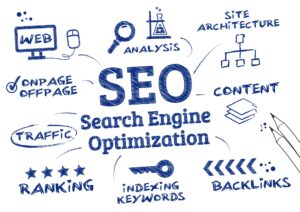What is on page off page SEO?
Search engine optimization (SEO) is the practice of optimizing a website to rank higher on search engine results pages (SERPs). On-page and Off-page SEO are two important aspects of SEO that are equally important to achieve a better ranking on SERPs.
(Looking For “Targeted keyword campaigns“? Contact us today?)

On-Page SEO:
On-Page SEO refers to the optimization techniques that are implemented on the website itself. This includes everything that is done to improve the website’s content, structure, and HTML source code to make it more search engine-friendly. Some of the on-page optimization techniques are:
- Keyword Research: Keyword research is the process of identifying the keywords or phrases that users use to search for a particular product or service. On-page SEO involves using relevant keywords throughout the website’s content to optimize it for search engines.
- Meta Tags: Meta tags are HTML elements that provide information about the webpage’s content to the search engines. The title tag, meta description, and meta keywords are important meta tags that should be optimized for better search engine rankings.
- URL Structure: A website’s URL structure is important for SEO. URLs should be descriptive and easy to read, including relevant keywords where possible.
- Content Optimization: Content is king when it comes to SEO. On-page SEO involves optimizing the website’s content for search engines. This includes ensuring that the content is relevant, informative, and engaging, and that it includes the relevant keywords.
- Site Structure: The website’s structure should be easy to navigate and user-friendly. This makes it easier for search engines to crawl and index the website’s pages.
Off-Page SEO:
Off-page SEO refers to the optimization techniques that are implemented outside of the website. This includes everything that is done to improve the website’s reputation, popularity, and authority on the web. Some of the off-page optimization techniques are:
- Link Building: Link building is the process of acquiring backlinks from other websites to the website being optimized. Backlinks are an important factor in determining the website’s authority and popularity on the web. Off-page SEO involves building high-quality backlinks from relevant and authoritative websites.
- Social Media Marketing: Social media marketing involves promoting the website’s content on social media platforms such as Facebook, Twitter, and LinkedIn. This can drive more traffic to the website and improve its popularity on the web.
- Guest Blogging: Guest blogging involves writing high-quality content for other websites in the same niche and including a link back to the website being optimized. This can lead to exposure, high-quality backlinks, and increased traffic to the website.
- Online Reputation Management: Online reputation management involves monitoring and managing the online reputation of the website. This can involve responding to reviews, addressing negative feedback, and promoting positive feedback. By managing the online reputation, the website can improve its credibility and authority on the web.
- Local SEO: Local SEO involves optimizing the website for local search. This includes optimizing the website’s content for local keywords, creating local business listings, and acquiring local backlinks.
In conclusion, On-page and Off-page SEO are two important aspects of SEO that are equally important to achieve a better ranking on search engine results pages. On-page SEO involves optimizing the website’s content, structure, and HTML source code to make it more search engine-friendly. Off-page SEO involves improving the website’s reputation, popularity, and authority on the web through activities such as building high-quality backlinks, social media marketing, guest blogging, online reputation management, and local SEO. By implementing both On-page and Off-page SEO techniques, businesses can improve their search engine rankings and drive more organic and referral traffic to their website.

Recent Comments